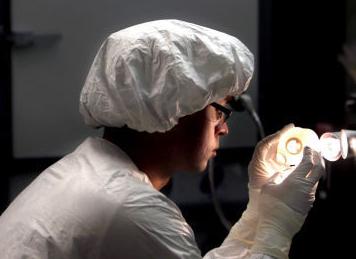Tucson-based artificial heart maker SynCardia Systems has filed for Chapter 11 bankruptcy reorganization with plans to sell all of its assets to a Philadelphia-based private-equity firm.
SynCardia, maker of the only FDA-approved temporary artificial heart, will continue operations without interruption, as an affiliate of Versa Capital Management LLC seeks court approval to buy the assets out of bankruptcy and recapitalize the company.
“Our first priority has been and will always be the relationship with our hospitals and the care of their many patients, none of which will be adversely effected by this sale process,” SynCardia CEO Michael Garippa said in a news release, adding the asset sale will “free the organization from substantial liabilities and maximize the value of our business.”
Versa specializes in buying and recapitalizing troubled companies. Its portfolio of turnaround projects includes retailers The Wet Seal, Avenue Stores and Black Angus Steakhouses; community newspapers under Civitas Media; and manufacturers Bell and Howell and Polartec.
SynCardia officials would not comment on the filing, referring to a news release issued by Versa.
To fund operations, Versa has agreed to provide the company with financing as it reorganizes in bankruptcy court. Under Chapter 11 of the federal bankruptcy code, debtors are protected from legal action while a plan is worked out to pay off debts.
Versa said in a news release the deal will ensure that SynCardia has adequate liquidity to continue to provide products and services to more than 120 SynCardia-certified implant centers worldwide during the sale process.
SynCardia filed a voluntary Chapter 11 bankruptcy petition Friday in the U.S. Bankruptcy Court in Delaware, where the company is incorporated.
The Versa asset purchase will require court approval, subject to higher or better offers, and the company has proposed that the sale process be completed in about 45 days, Versa said.
On Wednesday, a bankruptcy judge entered interim orders approving SynCardia’s bankruptcy financing plan and its use of cash to fund operations, subject to a final hearing on Aug. 1. The company also won interim approval to pay its employees and fulfill certain customer obligations.
In its bankruptcy petition, SynCardia said it did not expect to have funds available to repay its unsecured creditors, such as vendors.
It filed a list of more than 400 creditors, including current employees.
The company listed both its assets and debts in the range of $10 million to $50 million. It will be required to file more detailed financial statements in the coming weeks.
According to a list submitted with the bankruptcy filing, the company’s largest unsecured debts include $556,250 owed to an affiliate of Trinity Capital Investment and about $312,500 owed to University Medical Center Corp., which along with University of Arizona faculty members had supported SynCardia’s development.
In its stock registration filing with the U.S. Securities and Exchange Commission last September, the company said it had never been profitable on an annual basis. The company reported a net loss of $18.6 million in the first six months of 2015, after posting net losses of $10.6 million in all of 2013 and $18.1 million in 2014.
SynCardia’s temporary Total Artificial Heart is the only artificial heart approved by the U.S. Food and Drug Administration as a temporary bridge to transplant.
SynCardia says more than 1,500 of its artificial hearts have been implanted since the company was formed in 2001 with technology from the original Jarvik-7 heart, including nearly 500 since January 2012.
The company is working to win FDA approval of the use of its heart as “destination” therapy for patients who aren’t candidates for transplant, and it is developing a downsized heart to fit smaller patients, including women and youths.
Last year, SynCardia won FDA market approval for a smaller, portable pneumatic driver for its artificial hearts. The company issued a voluntary recall of its Freedom driver in August after one patient’s unit stopped pumping and his backup driver had to be turned on.
SynCardia’s Garippa said the proposed sale provides a strong foundation for future growth and development of the company’s next-generation heart driver system, the Freedom 2.
“We are acting to ensure that SynCardia will be in the best position to provide lifesaving treatments for end-stage heart failure and to adapt our business to meet the changing needs of the health-care industry,” he said.





